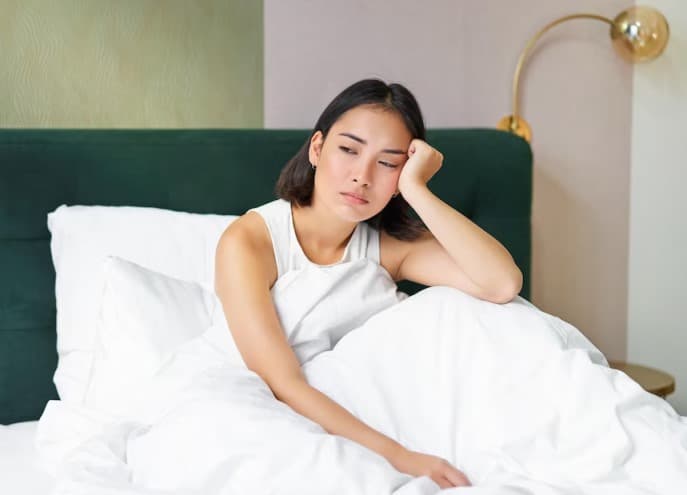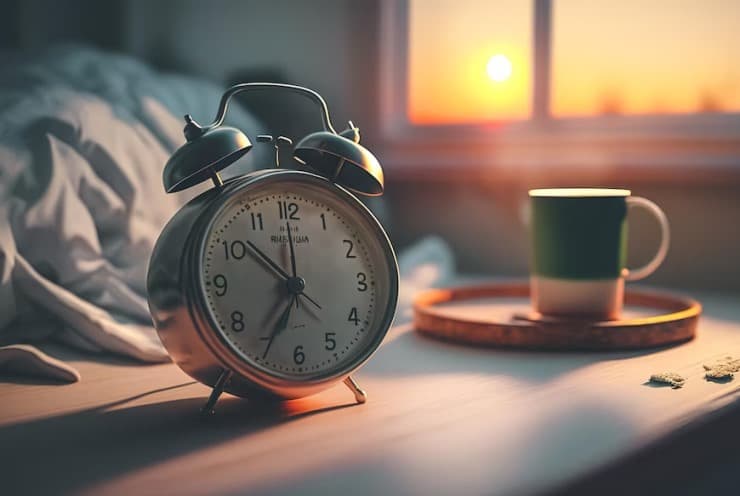In the journey towards improved sleep quality and mental well-being, there may come a time when you need to discontinue the use of certain medications like Trazodone. This decision can be influenced by various factors, such as changes in your medical condition, treatment plan adjustments, or simply the desire to explore drug-free sleep solutions.
However, navigating the process of sleeping after stopping Trazodone can be accompanied by challenges, which is why we’ve prepared this comprehensive guide to assist you in achieving restful nights naturally.
Trazodone and its Effects
Trazodone, a medication with a multifaceted nature, plays a pivotal role in the realm of mental health and sleep management. Its significance lies in its versatility, addressing a spectrum of conditions that affect millions worldwide.
Depression, a complex mental health condition, often necessitates pharmacological intervention to alleviate its impact. Trazodone steps into this arena as a serotonin modulator. By influencing the levels of this neurotransmitter, the medication contributes to an uplifted mood, diminishing the weight of depressive symptoms.
Beyond depression, Trazodone extends its benefits to the realm of anxiety disorders. Anxiety, characterized by excessive worry and apprehension, can be disruptive to daily life. The medication’s interaction with neurotransmitters brings about a calming effect, curbing the intensity of anxious feelings and promoting a sense of tranquility.
Moreover, Trazodone’s sedative properties hold the potential to transform the lives of individuals struggling with insomnia. In a world plagued by sleep disturbances, this medication offers a reprieve. By inducing a state of relaxation, it facilitates the transition from wakefulness to slumber, addressing the underlying causes of sleeplessness.
Read Also: Why Take Niacin at Bedtime?
How to Sleep After Stopping Trazodone?
Transitioning off trazodone can be accompanied by sleep disturbances. Here are practical steps to help you navigate this period and regain your sleep quality:
Embracing Healthy Sleep Hygiene
One of the first steps towards ensuring a smooth transition from Trazodone-assisted sleep to natural sleep is adopting a set of healthy sleep hygiene practices. These practices lay the foundation for restful nights and can significantly contribute to better sleep quality:
1. Maintain a Consistent Sleep Schedule
Regularity is key when it comes to regulating your internal clock. Endeavor to establish a consistent sleep schedule by retiring to bed and rising at the same times each day, even during weekends. This practice aids in aligning your body’s innate sleep-wake rhythm, promoting better sleep quality.
2. Create a Relaxing Bedtime Routine
Participate in soothing activities before bedtime to indicate to your body that the time has come to relax and unwind. This could include reading, gentle stretching, practicing mindfulness, or taking a warm bath.
3. Optimize Your Sleep Environment
Make your bedroom a sleep-friendly haven. Ensure that the room maintains darkness, tranquility, and a temperature conducive to comfort. If needed, contemplate investing in blackout curtains, earplugs, or a white noise machine.
4. Limit Exposure to Screens
The emission of blue light from screens can disrupt the production of melatonin, a hormone crucial for regulating sleep. Strive to steer clear of screens for at least an hour prior to bedtime, or consider employing blue light filters on your devices.
Exploring Natural Sleep Aids
While transitioning off Trazodone, it’s helpful to explore natural sleep aids that can facilitate the process. Here are a few options to consider:
1. Melatonin Supplements
Melatonin is a hormone that regulates sleep-wake cycles. Taking melatonin supplements, under the guidance of a healthcare professional, might help alleviate sleep disruptions during this transitional phase.
2. Herbal Teas
Chamomile, valerian root, and lavender are herbs known for their calming properties. Sipping on a cup of herbal tea before bed can promote relaxation and prepare your body for sleep.
3. Relaxation Techniques
Participating in relaxation methods like deep breathing, progressive muscle relaxation, or meditation can effectively alleviate anxiety and promote a sense of drowsiness, facilitating better sleep.
4. Cognitive Behavioral Therapy for Insomnia (CBT-I)
CBT-I is a structured program that can be effective in treating sleep disorders. It helps identify and change behaviors and thoughts that negatively impact sleep. Consider seeking a qualified therapist to guide you through this process.
Prioritizing Lifestyle Factors
As you adjust to sleeping without Trazodone, certain lifestyle factors can significantly impact your sleep quality:
1. Regular Physical Activity
Engaging in regular exercise, preferably earlier in the day, can contribute to better sleep. However, avoid intense workouts close to bedtime.
2. Balanced Diet
What you eat can affect your sleep. Refrain from consuming heavy meals and caffeine in the hours leading up to bedtime, as they have the potential to disturb your sleep. Instead, opt for light snacks if you’re hungry before bed.
Stay hydrated throughout the day, but limit your fluid intake in the evening to prevent nighttime awakenings.
Effects of Suddenly Stopping Trazodone
Abruptly discontinuing the use of Trazodone can have significant effects on both your mental and physical well-being. Trazodone affects the balance of certain neurotransmitters in the brain, and stopping it suddenly can lead to a range of withdrawal symptoms.
It’s crucial to understand these potential effects to make an informed decision and be prepared for what might come next.
Rebound Insomnia and Sleep Disturbances
Trazodone is often prescribed to aid sleep, so when you stop taking it suddenly, you might experience a rebound effect. This can result in difficulty falling asleep, staying asleep, or experiencing overall restless nights.
Sleep disturbances are among the most common withdrawal symptoms associated with stopping Trazodone abruptly.
Mood Changes
Trazodone also has an impact on mood regulation, which means that discontinuing it can lead to mood swings, irritability, and even heightened anxiety or depressive symptoms.
These emotional changes can be unsettling, but they are often a part of the withdrawal process as your brain readjusts to functioning without the medication.
Flu-Like Symptoms
Some individuals who suddenly stop taking Trazodone might experience flu-like symptoms, including nausea, dizziness, and headaches. These physical symptoms can be uncomfortable, but they typically subside as your body adapts to the absence of the medication.
Cognitive Disturbances
Trazodone withdrawal can sometimes lead to cognitive disturbances such as difficulty concentrating, memory issues, and brain fog. These effects are usually temporary and should improve over time as your brain chemistry stabilizes.
Risk of Serotonin Syndrome
While Trazodone is generally considered safe, there is a potential risk of serotonin syndrome if it’s stopped suddenly. Serotonin syndrome manifests when there is an undue buildup of serotonin in the brain.
Symptoms can range from mild (restlessness, rapid heart rate) to severe (high fever, seizures, irregular heartbeat). It’s important to seek medical attention immediately if you experience any symptoms that could indicate serotonin syndrome.
Conclusion
In the journey towards achieving quality sleep after discontinuing Trazodone, prioritizing healthy sleep hygiene practices, exploring natural sleep aids, and making positive lifestyle changes are essential steps. By embracing these strategies, you can pave the way for restful nights and improved overall well-being.
Certainly, keep in mind that each person’s path is distinct, so be patient with yourself as you work towards better sleep. If sleep troubles persist, don’t hesitate to reach out to a healthcare professional for guidance and support.

